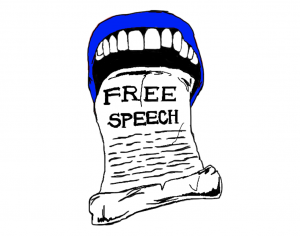Kendall Anthony-Busbee
Contributor
[email protected]

While the U.S. traditionally serves as a beacon for press freedom, trust in news media dewindles almost daily, largely in part to the President Donald Trump and his administration condemning credible news outlets, according experts in the field.
“Criticism of public figures is a time-honored tradition for the American press since before we even became a nation,” said Kate Martin, lead investigative reporter for Carolina Public Press. “When people no longer know what is going on where they live, they can no longer make informed decisions for their families. An informed populace is essential for a true democracy to function.”
Martin said reporters hold the responsibility to research and report on issues in their community when others can’t.
“Sometimes the problems are completely hidden from public view and all it takes is a reporter to shine a light on it for people to start talking about solutions, Martin said.”
At the center of American journalism lies the ability to freely criticize the government, even if those attacks are personal.
“As a journalist writing commentary for many years, I felt it was my duty to criticize presidents Clinton, Bush, Obama and Trump at times, while giving each credit where it was due at other times,” said Frank Taylor, managing editor for Carolina Public Press. “I also criticized and praised governors, mayors and sheriffs, among others. In each case, only the supporters of the person being criticized thought this was ‘disloyalty.’ In other words, this complaint is just whining from partisans who tend to suffer from blind loyalty to leaders. That’s a trait that is not very conducive to democratic society in the first place.”
Journalists must take these aspects into account when gathering and reporting the news, as maintaining objectivity is essential, according to Virginia Daffron, managing editor for Mountain Xpress.
“The president has communicated a number of messages about the media. He calls into question the biases of media outlets he views as critical of him or his policies,” Daffron said. “Loyalty and patriotism are the wrong set of values to demand from the media, whether mass or otherwise. Responsible media outlets should value objectivity while realizing that all humans hold biases that are difficult to overcome.”
According to Ellen Pearson, a professor of history at UNC Asheville, this unique American perspective on freedom of speech echoes throughout time in instances such as the trial of John Peter Zenger.
“Zenger’s case is important for many reasons. It affirmed the power of the jury in Anglo-American law, for one thing. They refused to convict Zenger, despite specific directions from the judge to convict. At the time of the trial, truth was not a defense in accusations of seditious libel,” Pearson said. “However, Zenger’s attorney, Andrew Hamilton, argued that New York’s libel law should and could differ from English law, if the jury thought it appropriate. In other words, without much precedent on his side, Hamilton was arguing that the jury could make law. While this trial didn’t establish any new law over seditious libel, it did allow the press to feel more confident in their freedom to print what was truthful, even if it went against the will of the government.”
While the Zenger case did not change the law, it emphasized the importance of truthful publications, according to Debbi van Tuyll, a professor of communications at Augusta University.
“I believe Zenger had a lot to do with creating the American mindset regarding the importance of free speech. Of course, there were other issues, like the 1765 Stamp Act and the American Revolution, for example,” Tuyll said. “But Zenger is where it started, so while it might not have been a legally important case, I believe it was a historically important case.”
The trial of Zenger was an important building block for newspaper publishers to print their honest views, said Nicholas Hirshon, a professor of communication at William Paterson University.
Hirshon said without Zenger, the American press may have turned out far different than it is today.
“The Zenger trial is the foundation of freedom of expression in our country. It’s almost impossible to think how different journalism history might have been if the jury had found John Peter Zenger guilty and criminalized truthful criticism of the government,” Hirshon said. “Imagine if no editorial writer or television commentator was allowed to criticize the mayor or the governor or the president? As a former journalist myself, I can’t even fathom what the press would look like under those sorts of restraints.”
Contemporary journalists must remain impartial and avoid even the appearance of conflicts of interests, which can be achieved through truthful publication, Martin said.
“In my work, I try to hold the powerful to account for their actions using public records, data and interviews with sources,” Martin said. “Throughout my career sources have said I have been overly critical of them by printing facts in a newspaper or on a website. I give them ample opportunity to respond and include that response in my work.”
Many argue reporters represent the public, and thus have an obligation to criticize public figures, Tuyll said.
“Our libel law, as of 1964 with the New York Times v. Sullivan case, makes it almost impossible to libel a public figure or official. That’s as it should be,” Tuyll said. “If you see out the public light through public service or public performance, you’re asking the public to comment on your work. Take your lumps and get over it.”
Placing limitations on the press could lead to immense loss suffered by the public at large, especially in a democracy within which voting matters, according to Megan Suggs, a government reporter for the Statesville Record and Landmark.
“When council members are name calling and acting like children in a public meeting, I can document that. When they’re so dug in on their opposing opinions that they can’t come to a compromise serving as much of the city as possible, I can document that,” Suggs said. “When there is a divisive issue brought up during council meeting, I can try to call each elected official and get their opinion on the record to share with my readers who can then base their vote on that.”
Denying knowledge on a range of issues could affect the public’s ability to govern themselves within a complex world, Suggs said.
“Elected officials, especially, are not just celebrities we’re gawking at for entertainment. They are employees of the public and if they are not doing their jobs to the expectations of their bosses, the constituents who can fire them next election by electing someone else, there needs to be a free press to hold these employees accountable,” she said.
According to Tuyll, without reporters asking questions that suggest validity of other viewpoints, the public lacks important information upon which change may arise.
“We have to be informed to know that change is necessary,” Tuyll said. “If we keep ourselves intentionally ignorant by suppressing the press, or even by choosing not to consume news on a regular basis, then we are contributing to maintaining the status quo, regardless of how much we claim not to like it or to support government policies.”
The public necessitates accurate and truthful news to sustain a functioning democracy, Daffron said. Obstructing such a necessity compromises the entirety of the news media’s purpose.
“As citizens, we require an accurate and complete understanding of issues and events to participate in our democratic process in a meaningful and constructive way,” Daffron said. “Freedom of the press ensures that newspapers and other information sources can collect and share information without fear of interference or reprisal. Without that assurance, news sources would need to weigh the potential negative consequences of sharing truthful information and would in some cases decide the risk was too great, undermining the public’s access to and trust in available information.”
Daniel Walton, editor for Mountain Xpress, reflected on the importance of preserving a free press and how the current president’s stance could be detrimental to the public’s perspective.
“A free press gives people examples of different stories beyond the ones told by those currently in power. The president’s message is clear: he calls mainstream media outlets such as The New York Times and CNN the enemy of the American people,” Walton said. “He’s saying that the stories we tell seek to harm everyday citizens, to invalidate their perspectives and support those who want to take advantage of the country. By implication, he’s also saying that people should trust the government as their source of news, that the official story is the only valid story.”
Though Trump and his administration may seek to limit press freedom, the more imminent threat may lie within the news media itself, according to Taylor.
“Trump has indicated some measures that would limit press freedoms or access to government, but it’s not clear that he could actually put these into effect without the courts stopping him.” Taylor said. “It seems to me that Trump is an anomaly, a four-year or eight-year blip in our nation’s history that will seem irrelevant a few years after his time in office has passed. Other than not giving in to his nonsense, I think we should avoid worrying too much about Trump’s threat to the news media and worry more about the news media’s threat to itself.”
Many, like Taylor, see the rise of fake news as a major contributor to the public’s dwindling trust in news media.
“Many of these organizations have indeed pushed ‘fake news’ stories, such as the birther conspiracy against President Obama. But they have tended to muddy the waters by accusing the traditional news media, sometimes critiqued by both the fringe right and fringe left as the ‘mainstream media’ or ‘msm,’ of being the ones pushing fake news or engaging in a conspiracy to cover up real news,” Taylor said. “But however ridiculous some of these new voices have been, the public has struggled to discern the difference between legitimate and biased or fake news. When you can’t tell the difference between what’s real and what’s fake, you lose trust in all of it.”
The business aspect of news may be feeding the trend of misinformation, and impacting the news industry negatively, he said.
“For a free press to be meaningful it must embrace honest and fair guidelines for news gathering, story-telling and commentary. It must strive to investigate and report on public interest issues that matter rather than just the latest celebrity or sports stories that may get more clicks,” Taylor said. “This is difficult in a business environment in which survival is in question, so the ability of the press to exercise its freedom effectively and consistently is very much in doubt right now.”
The consensus among journalists and historians alike confirms the value of maintaining a free press.
“As our country has become more diverse, we’ve got a whole lot more ideas that can compete in the marketplace of ideas,” said Tuyll. “We’ve got a generation who believe that offensive speech is speech that should be censored, to which the historical answer would be, ‘Answer offensive speech with more speech. Don’t suppress it.’ In sum, freedom of the press is important because the press is the one institution that exists that can connect Americans to their government.”
While libel laws in the U.S. currently aim to protect journalists, the possibility of this safeguard’s destruction lingers, Hirshon said.
“Supreme Court decisions can be reversed, and there’s no guarantee that New York Times v. Sullivan will remain the law of the land forever,” Hirshon said. “Journalists have to remain vigilant and keep making the case that they can’t bring information to the public without strong libel laws that protect them from frivolous litigation from people who don’t like what they said, even when those statements are truthful.”
The news media’s time-honored responsibility to provide the American public with truthful and accurate journalism still stands, no matter the circumstances, Taylor said.
“The U.S. is great because of The Declaration of Independence and Constitution, especially the Bill of Rights,” Taylor said. “It is not great because an accident of the electoral college made Donald Trump president. It is great despite Trump. This is true regardless of who is president.”


![Brooke Pedersen [second from the right] and Luis Reyes [right] hold banners during the Wrap The Woods event.](https://thebluebanner.net/wp-content/uploads/2025/09/ELIZABETH_PRITCHITT_IMG_3470-1200x804.jpg)



















